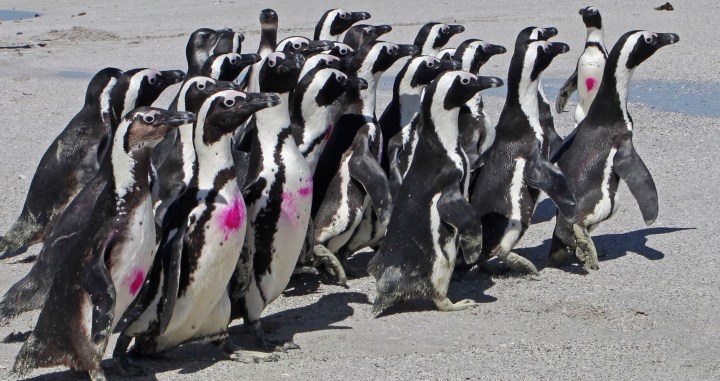SPECIES IN CRISIS
Creecy has new plan to halt rapid decline of African penguin

A 2013 biodiversity management plan to save the endangered species has failed to arrest the population drop. Now, Environment Minister Barbara Creecy is seeking public comment on a fresh draft.
African penguins once churned up the water in great numbers on South Africa’s west coast. Now they are listed as endangered by the International Union for Conservation of Nature.
And according to the Department of Forestry, Fisheries and the Environment (DFFE), the species’ population has declined rapidly from more than a million breeding pairs in the 1920s to a record low of more than 10,400 pairs in 2021.
Owing to this decline, the African penguin, which is endemic to Namibia and South Africa, has been identified as one of three penguin species globally that are in critical need of conservation action.
According to Professor Lorien Pichegru of the Coastal and Marine Research Institute at Nelson Mandela University — who has been conducting research for the past 15 years on the impacts of various anthropogenic threats to African penguins in Algoa Bay — the Dassen Island colony, which was once the world’s largest African penguin colony, had collapsed by 90% in the mid-2000s, making the St Croix Island colony in Algoa Bay the next-largest, although that is collapsing too.
To arrest this, Environment Minister Barbara Creecy has released a draft African Penguin Biodiversity Management Plan (APBMP) and is calling for public comment.
A Biodiversity Management Plan for the African penguin was first gazetted in 2013, with the aim of halting the decline of its population in South Africa. According to the department, while many of the actions listed in the plan were implemented successfully, the BMP (2013) did not achieve its aim and populations continued to decline, albeit at a slower rate.
The new draft APBMP attributes the decline of the species to various factors including reduced availability of forage fish, oil spills, breeding habitat modification, extreme weather events and disease. Predation by Cape fur seals and kelp gulls has localised colony impacts.
The APBMP aims to improve the conservation status of the species, ensure that no extant colonies become extinct, maintain the socioeconomic benefit that African penguins generate and support iterative improvement in the knowledge base for adaptive management.
Food is the priority
The head of conservation at the Southern African Foundation for the Conservation of Coastal Birds (Sanccob), Nicky Stander, said the draft plan is an important framework for conserving the remaining populations.
“Sanccob is one of the organisations that formed the drafting team for both the first APBMP and subsequently the second draft version, collaborating with the Department of Forestry, Fisheries and the Environment, penguin colony management authorities, academia, research institutions, the fishing industry and other NGOs,” she said.
Read in Daily Maverick: “Shocking drop in number of African penguin numbers for Algoa Bay”
“Sanccob plays an important role in the conservation of endangered African penguins and is committed to supporting the government in implementing the critical actions outlined in the draft BMP. We will be submitting comments before 21 August 2022, reinforcing the urgent conservation interventions required to prevent further declines of the species.”
Stander said that, while the decline of the African penguin population has a long history, involving various threats, the priority intervention now is food security.
Visit Daily Maverick’s home page for more news, analysis and investigations
“African penguins depend on small pelagic fish, primarily sardine and anchovy, and the abundance of these fish has been shown to impact penguins’ breeding success and survival. The challenge lies where African penguins’ foraging areas overlap with commercial fisheries.
“Decisions to ensure sufficient food for African penguins (in fact all top predators in the Benguela Upwelling Ecosystem) thus need to take place at spatial and temporal scales that take their full life cycle into consideration.”
The new draft APBMP “has identified new and emerging threats, such as disease outbreaks, at-sea threats and anthropogenic impacts that require careful monitoring and mitigation measures”, she said.
Read more in Daily Maverick: Penguins in crisis as sardine populations plummet
Although the 2013 plan had not halted the species’ decline, actions listed in it “are ongoing, including improving food availability, predation management and marine pollution preparedness and response”.
‘Catastrophic collapse’
Algoa Bay Conservation environmental scientist Ronelle Friend said the plan should have been reviewed in 2018, and in the four years since, “St Croix Island lost 4,000 breeding pairs of African penguins” — an 80% drop.
“That is a catastrophic collapse of a colony! Were the plan in place in 2019, this collapse could possibly have been prevented, but maybe not.”
Friend said the 2013 APBMP was an utter failure.
Read in Daily Maverick: “Dwindling African penguin colonies — what needs to happen to restore the balance”
“If the decline of the penguin population is the criteria to apply (which it should be) then with a 45% decline in penguin numbers in South Africa since the implementation of the plan, it shows that the plan was totally inadequate… why will the APBMP plan of 2022 be any different?” she asked.
Her concerns included:
- The deeply controversial closure of fishing zones around colonies;
- Failure to identify the dire situation on St Croix Island, where the colony has decreased by 84% in five years and is sliding on a steep path towards total collapse;
- The APBMP is very much generic and not risk-based, since the risks are not the same for all colonies. The start should be to determine the real and immediate risks that face individual colonies and address those;
- The influence of bunkering and marine traffic identified as catastrophic events — they are not catastrophic, but result in the continual exposure of African penguins to vessel movement, bunkering operations, and water and noise pollution;
- No provision is made for actioning on precautionary principle in case of marine industry development around colonies;
- Funding requirements are not addressed in the plan as several requirements need funding;
- No provision is made to engage with interested parties, such as the public.
Friend said that in 2021 the minister acknowledged there were legislative gaps in environmental law that allowed ship-to-ship bunkering in Algoa Bay, in close proximity to an endangered African penguin colony, without the need to perform any risk or impact assessment.
Read more on Daily Maverick: African penguins are heading towards extinction – here’s how we can save them
“Algoa Bay Conservation has tried to obtain the penguin breeding pair numbers for the islands in Algoa Bay for 2022 after the counting process was completed. Academia was not forthcoming with the information, Sanccob did not have the numbers, and the DFFE did not want to release the numbers to us. We had to complete a PAIA (Promotion of Access to Information Act) application and serve it on the DFFE. I am still waiting for the information,” she said. DM/OBP





















 Become an Insider
Become an Insider
Creecy must be transparent in all matters pertaining to nature conservation.
Creecy needs to learn about systems thinking, aka “complexity”. Patchwork fixes will be a waste of time and money. She could start by reading some George Monbiot. To attend to matters of environment, it is pointless not to view entire systems together in their interlinking functions and values.